You know, those mythological Greek heroes were like the rockstars of their time, no joke. They were these extraordinary folks who didn’t just walk the walk – they sprinted it while juggling fire, so to speak. I mean, these were the guys who faced insurmountable odds and looked danger in the face like it was just another day at the office.
And what’s even cooler is that most of these heroes were part-human, part-god hybrids. Talk about an impressive lineage, right? They had this divine touch that set them apart from regular folks. Think Hercules, for example – half god, half mortal, all muscle. These semi-gods had this extra edge that made their feats even more mind-blowing.
Their stories? Man, those were like the blockbuster movies of their time. Epic tales filled with monsters, quests, and epic battles. It’s like they were these ultimate underdogs who rose to the challenge and saved the day. These stories weren’t just entertainment; they were a legit part of Greek culture, passed down from generation to generation, inspiring everyone who heard them.
And you know what’s awesome? These stories still have that power today. They’re like timeless reminders of what humans can achieve when they dig deep and face their fears head-on. I mean, who wouldn’t want a little bit of Hercules-level courage in their lives? These heroes are like the OG motivators, showing us that even when the odds seem impossible, we’ve got that inner strength to pull through.
Heracles (Hercules)
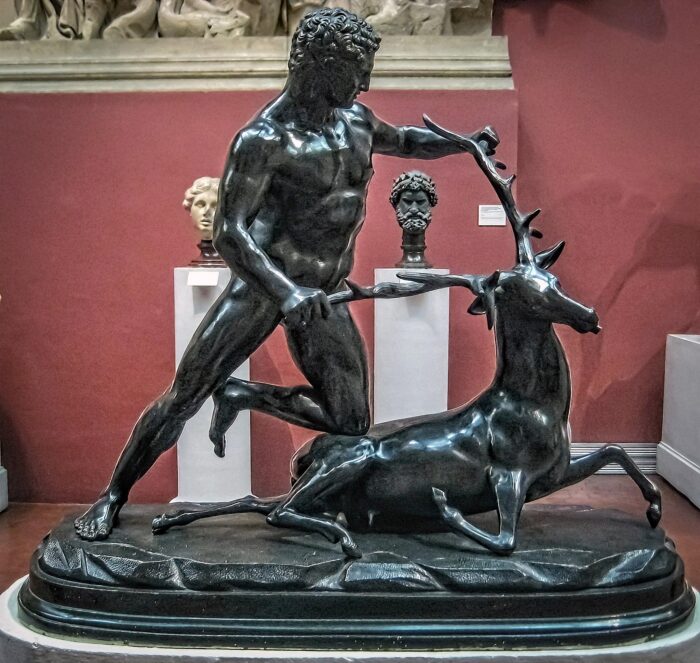

Heracles is also known as the ultimate action hero in Greek mythology.
This guy was like the original superhero, born with an extra helping of courage and strength thanks to his heavenly genes – Zeus, the big cheese of gods, was his dad. But here’s the kicker: his mom was a mortal woman named Alcmene. Talk about an interesting family dynamic, right?
As a young dude, Heracles wasted no time in showing off his muscles. I’m talking lion-wrestling and monster-slaying right off the bat.
The lion of Nemea was no ordinary one, and he’s like, “I got this,” and takes it down with his bare hands. And that’s just the warm-up. The Hydra, a beast with multiple heads, didn’t stand a chance against him either. The guy even went on a grand quest with the Argonauts to find the Golden Fleece. Yeah, no big deal.
But life wasn’t all smooth sailing for our hero. The gods loved throwing curveballs at him, like the Twelve Labors. These were basically superhuman tasks that would make anyone else break a sweat just thinking about them. Think cleaning stables that haven’t seen a broom in centuries or taking down wild creatures that could snack on you in a heartbeat.
And let’s not forget his run-ins with Hera, the queen of the gods. She had a major beef with Heracles, and it led to some seriously messed-up stuff, like him accidentally taking out his own family. But hey, he didn’t let that stop him. Heracles kept on fighting, helping out Prometheus and even joining in on the Trojan War.
The cherry on top? After all the blood, sweat, and tears, Heracles earned his spot among the gods as one of the Olympians. He wasn’t just strong physically, but also in spirit, showing us that no matter how tough life gets, you can rise above it and turn your story around. It’s like he’s the poster child for resilience, reminding us that we’re stronger than we think, even when the gods throw some crazy challenges our way.
Read all 12 labours of Hercules in great detail.
Theseus
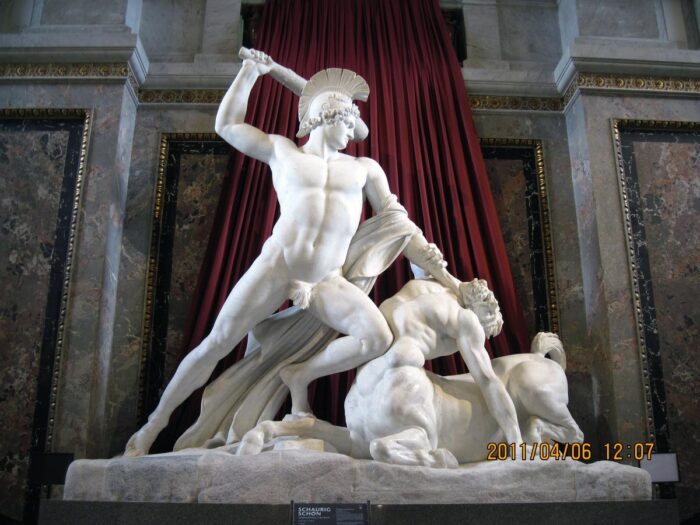

Let me introduce you to Theseus, the guy who didn’t just slay a Minotaur – he basically had a whole checklist of heroic deeds to complete. You’ve heard about the Minotaur story, right? The labyrinth, the beast with the head of a bull, and all that? Yeah, that’s the one. But wait, there’s more!
Theseus wasn’t just chilling in Athens waiting for a Minotaur to show up. Nope, his dad, King Aegeus, had this brilliant idea to put him through a bunch of tasks, kinda like a hero internship. These tasks, known as the “labors of Theseus,” were like his resume for becoming the future ruler of Athens.
It was like a hero to-do list, and Theseus was ready to tick off each challenge. First off, there was the Periphetes, a nasty dude with a club who thought he was some kind of villainous golfer. Theseus had other plans and knocked him out of the park – metaphorically speaking.
Then came Sinis, the Pine Bender, who was into some serious tree gymnastics. Theseus taught him a lesson in how not to bend trees, trust me. The Crommyonian Sow, another “labor,” was basically a wild boar causing mayhem. Theseus showed it who’s boss, proving he wasn’t one to mess with.
And there was Procrustes, aka the Stretcher. This guy had a bed that could stretch or shrink you to fit – talk about a real nightmare before bedtime. But Theseus had a taste of his own medicine in store for him.
Finally, the icing on the cake – the Minotaur. Theseus ventured into that labyrinth like a boss, using his wits and bravery to slay the beast and end its reign of terror.
So, Theseus wasn’t just the Minotaur slayer; he was the hero who took on every challenge his dad threw at him. He was like the ultimate intern, proving he had what it takes to wear the hero crown and rule Athens like a true legend.
Here are the eight most well-known labors of Theseus:
- The Periphetes: Periphetes was a notorious criminal who roamed the roads of Greece, attacking travelers with his iron club and stealing their belongings. Theseus encountered him on his journey to Athens, and the two engaged in a fierce battle. Theseus eventually defeated Periphetes by using the bandit’s own weapon against him, killing him with his own club.
- Procrustes’ bed: According to legend, Procrustes would capture travelers passing through his territory and invite them to spend the night in his iron bed. If the traveler was shorter than the bed, Procrustes would stretch their limbs until they fit perfectly. If the traveler was taller than the bed, he would chop off their legs until they fit. When Theseus encountered Procrustes on his journey to Athens, he was invited to stay the night in the bandit’s bed. Theseus, however, turned the tables on Procrustes and used the bed to his advantage. He tricked Procrustes into lying down in the bed himself, and then stretched or chopped off his limbs until he fit the bed perfectly. Theseus’s defeat of Procrustes has become a popular legend, and his name is often used to describe anyone who imposes rigid conformity on others.
- The Sinis: Theseus encountered the thief and murderer Sinis, also known as “Pityocamptes”, a notorious bandit who terrorized travelers on the Isthmus of Corinth. Sinis had a cruel method of killing his victims. He would tie them to two pine trees bent to the ground, and then let the trees go, causing the victim’s body to be torn apart. This earned him the nickname “Pityocamptes,” which means “pine bender”. When Theseus encountered Sinis on his journey, he tricked him into using his own method of execution. Theseus tied Sinis to the same pine trees he had used to kill his victims and then let the trees go, causing Sinis to be torn apart.
- The Crommyonian Sow: Theseus was tasked with capturing a monstrous sow, which was ravaging the countryside. He caught the sow and brought it back alive to Athens.
- The defeat of Sciron: Theseus encountered the thief and murderer Sciron, who would force travelers to wash his feet and then kick them off a cliff into the sea. Theseus defeated Sciron and threw him off the cliff.
- The capture of the Cretan Bull: Theseus was tasked with capturing the wild Cretan Bull, which was destroying the countryside. He succeeded in capturing the bull and brought it back to Athens.
- The capture of Marathonian Bull: Theseus was also tasked with capturing the wild Marathonian Bull, which was also destroying the countryside. He succeeded and brought it back to Athens.
- Slay of the Minotaur: He achieved that by using a ball of thread, given to him by Minos’ daughter Ariadne, to navigate the labyrinth and kill the monster, which also showcases his intelligence and cunning.
Theseus’ labors demonstrate his strength and bravery as a hero and his commitment to completing the tasks assigned to him by his father.
Theseus is remembered as one of the greatest heroes in Greek mythology, and his story has been retold in literature and art for centuries.
Perseus
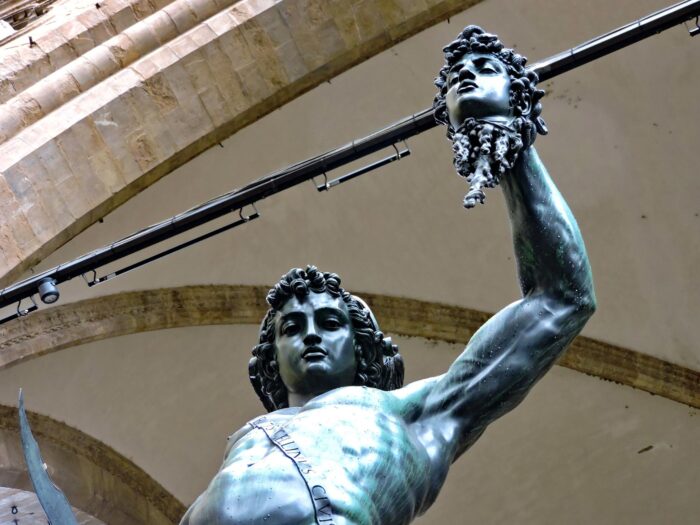

Alright, gather ’round, folks, and let me tell you about Perseus – the guy who took on some of the most legendary challenges in Greek mythology, and totally aced them!
So, Perseus wasn’t your average Joe – he had some divine blood running through his veins, thanks to his dad, Zeus, and his mom, Danaë. Now, this guy’s got a resume full of epic quests, but let’s start with the big one:
Medusa. Imagine facing a Gorgon – a snake-haired lady whose gaze turns you to stone. Sounds fun, right? But wait, Perseus had a trick up his sleeve – well, not literally. With a mirrored shield to dodge Medusa’s stare, a sword to slice her head off, and some fancy winged sandals to make a quick getaway, he showed that Medusa wasn’t so invincible after all.
But that’s not all. Perseus had this heroic combo move – he rescued Princess Andromeda from a sea monster. Yep, that’s right, a sea monster. How? Well, he used Medusa’s head to turn the monster into a stone sculpture. Talk about creativity!
Oh, and let’s not forget the giant-slaying part. Perseus took down the not-so-friendly Polydectes, who thought he could mess with Perseus’ mom. Big mistake. And then there was the Calydonian boar hunt – another feather in Perseus’ heroic cap.
But what sets Perseus apart is his smarts. He didn’t just rely on his brawn; he had the gods in his corner. Athena and Hermes hooked him up with some serious gear to tackle these challenges head-on. And tackle them he did.
So there you have it – Perseus, the ultimate mythic multitasker. From slaying Medusa to saving damsels in distress, he’s the guy who proved that brains, bravery, and a bit of divine help can take you places. His stories have been echoing through history, inspiring artists, writers, and dreamers, and reminding us all that with a little creativity, even the toughest quests can be conquered.
Jason
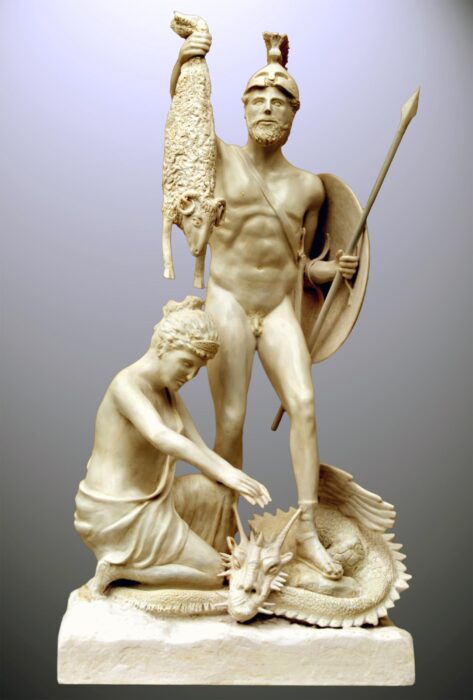

Jason is the guy who made a name for himself leading the legendary Argonauts!
So, Jason was a young lad with some serious family drama. His uncle, Pelias, decided he wanted the throne of Iolcus for himself, leaving Jason’s dad out in the cold. Not cool, right? Jason wasn’t having any of it. He was determined to reclaim his rightful spot on that throne.
Enter the Oracle of Delphi – Pythia tells Jason that the key to kingship is the elusive Golden Fleece, chilling in the land of Colchis. No biggie, right? But Jason’s not in this alone. He rallies a bunch of heroes, calling them the Argonauts, and they set sail on the good ol’ ship Argo.
Now, this journey wasn’t all smooth sailing. There were giants, sorceresses, and these gnarly rocks that would crush ships like soda cans. Talk about a rough road trip! Eventually, they make it to Colchis, where King Aeetes is holding the Golden Fleece like a prized possession. But wait, here’s where things get interesting.
Enter Medea, daughter of King Aeetes – and a sorceress with a soft spot for Jason. She helps him get his hands on that fleece, falling head over heels in love with him. But here’s the kicker: Jason promises to marry her and whisk her away to Greece. Everything seems peachy, right? Well, hold on tight.
Fast-forward to the homecoming in Iolcus. Jason’s got a new bride and, well, he ditches Medea like yesterday’s news. And let’s just say, Medea doesn’t take kindly to heartbreak. She goes full-on revenge mode, taking out her anger on their kids and the new bride. Yikes!
So, what’s the takeaway here? Jason’s got guts, no doubt. Leading the Argonauts through challenges and snatching that fleece – impressive stuff. But he’s also got his flaws, and his choices came with some seriously messy consequences. Jason’s story serves as a reminder that even heroes can stumble and fall, proving that Greek mythology is as complex and relatable as any modern-day drama.
Achilles


Achilles is the ultimate warrior with a twist of fate that’s as legendary as it gets!
Meet Achilles, a dude with a mix of mortal and divine lineage. His mom was Thetis, a sea goddess, and his dad was Peleus, a mortal king. Now, here’s the kicker – Thetis wanted her boy to be indestructible, so she dunked him in the magical River Styx. Everything was all good, except for that pesky heel that wasn’t dipped. And guess what? That’s the only chink in his armor.
Achilles was no ordinary warrior – he was like the rock star of ancient Greece. Strong, brave, and a killer on the battlefield, he was basically the G.O.A.T. of warriors. But here’s the thing: he was also kinda known for his big ego. His pride and arrogance were off the charts, and that’s where things get interesting.
Now, you might’ve heard about the Trojan War – that’s where Achilles made his name. He became Greece’s poster boy for awesomeness. But, oh boy, his pride got the better of him. He had a beef with Agamemnon, the Greek leader, and decided to take a time-out from fighting. Cue a whole bunch of Greek defeats.
But the real deal comes when his BFF, Patroclus, bites the dust thanks to Hector, the Trojan prince. Achilles goes from zero to hero mode, hunting down Hector and settling the score. He basically drags Hector’s body around like a trophy. Dark stuff, right?
And then comes his own downfall – a sneaky arrow shot by Paris, guided by Apollo, finds that one vulnerable spot: his heel. Bam! Achilles is donezo.
Now, here’s the twist – his story doesn’t end there. His lover and BFF, Patroclus, decides to join him on the other side by burning on the same funeral pyre. Talk about loyalty!
Achilles’ journey is like a roller coaster of epic proportions. He’s got the skills, the ego, and a vulnerability that leads to his ultimate downfall. But hey, that’s what makes him one of the most captivating figures in Greek mythology, with his story echoing through the ages in books, art, and movies.
Odysseus
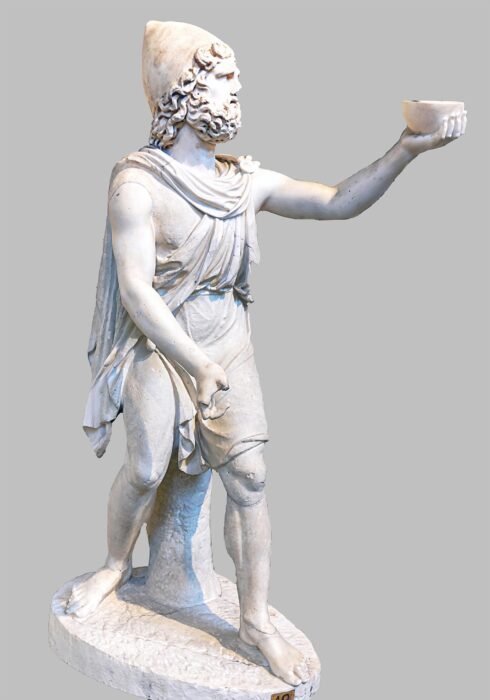

Let’s talk about the legendary Odysseus – the guy with brains as sharp as his sword, and a journey so wild it’s become the stuff of legends!
So, meet Odysseus, the king of Ithaca. He’s got brains and brawn, but let’s be real – it’s his cleverness that steals the show. He’s not just a warrior; he’s a mastermind.
Now, we can’t talk about Odysseus without mentioning the big showdown: the Trojan War. Yep, that one! He fought alongside his Greek pals, and he’s the brains behind the famous Trojan Horse – you know, that sneaky trick where they hid soldiers inside a wooden horse? Classic.
But wait, there’s more! After that epic war, our hero faces another epic journey. He’s just trying to get back home to Ithaca, where his wife Penelope and son Telemachus are waiting. Sounds simple, right? Nope, not with all the crazy stuff that happens along the way.
He faces all sorts of hurdles, from battling a cyclops named Polyphemus to dealing with sirens who sing songs that make sailors crash into rocks. Oh, and don’t forget about that pesky witch-goddess Circe who turns his men into pigs. Yep, pigs.
But Odysseus isn’t called cunning for anything. He manages to outsmart these challenges one by one, using his quick thinking and his ability to spin a tale like no other.
The Odyssey, Homer’s epic poem, tells the whole saga – ten years of twists, turns, and crazy adventures. It’s like a roller coaster ride through the ancient world.
Odysseus is more than just a hero; he’s a symbol of cleverness and perseverance. His journey home isn’t just about getting back to his family – it’s a test of his wit, his strength, and his ability to outsmart even the wildest challenges.
So, next time you’re in for a thrilling tale of epic proportions, remember the name Odysseus – the guy who proved that brains can be just as powerful as muscles.
Here are some of the most notable obstacles he faces:
- The Cicones: After leaving Troy, Odysseus and his men encounter the Cicones, whom they battle and defeat. However, they stay too long and are attacked by reinforcements, resulting in the loss of several ships and men.
- The Lotus-eaters: Odysseus and his men encounter the Lotus-eaters, who offer them a narcotic fruit that causes them to forget their desire to return home. Odysseus is able to rescue his men and continue their journey.
- The Cyclop Polyphemus: Odysseus and his men are trapped in the cave of the Cyclops Polyphemus, who eats several of the men. Odysseus eventually blinds Polyphemus and escapes, but angers the god Poseidon in the process.
- Aeolus and the bag of winds: Odysseus receives a bag of winds from the god Aeolus, which should have helped them return home. However, his crew mistakenly opens the bag, causing a storm that blows them off course.
- Laestrygonians: Odysseus and his men landed on an island where the inhabitants turned out to be man-eating giants. They destroyed most of Odysseus’ ships and killed many of his men.
- Circe: Odysseus and his men are turned into pigs by the witch-goddess Circe. With the help of the god Hermes, Odysseus is able to resist her magic and force her to return his men to human form.
- The Underworld: Odysseus had to travel to the Underworld to speak to the prophet Tiresias to learn how to get home. There, he encountered the shades of various dead heroes and his mother.
- The Sirens: Odysseus and his crew sailed past the Sirens, who lured sailors to their deaths with their enchanting voices. Odysseus had his men plug their ears with wax and tie him to the mast so he could hear their song without being lured to his death.
- Scylla and Charybdis: Odysseus had to navigate between these two dangerous sea monsters, with Scylla being a six-headed monster that ate sailors and Charybdis being a massive whirlpool that could sink ships.
- The island of Helios: Odysseus’ men disobeyed his orders not to eat the sacred cattle of the sun god Helios, and as a result, they were all killed by Zeus’ thunderbolt.
- Calypso’s Island: Odysseus was trapped on the island of Calypso, who kept him captive as her lover for seven years.
- Suitors in his palace: Odysseus returned home to find his palace overrun by suitors trying to win the hand of his wife, Penelope. He had to use his cunning and strength to defeat them and reclaim his throne.
Oh, Odysseus – the ultimate master of wit and strategy! This guy’s journey is like a crash course in outsmarting the universe.
Odysseus cruises back to Ithaca after all those wild adventures, but instead of a grand entrance, he disguises himself as a beggar. Talk about thinking on your feet, right? He’s all about keeping a low profile and catching his enemies off guard.
And those suitors who thought they could just slide into his place while he’s away? Nope, not on Odysseus’ watch. He hatches this brilliant plan to take them down – gotta love a hero who doesn’t settle for just any old revenge.
His journey is a testament to his brainpower, courage, and sheer determination. Imagine the obstacles he faces – monsters, enchantresses, and the whole sea of challenges – and he’s there, tackling them with his wits and fearless spirit.
But it’s not just about survival; it’s about making a statement. Odysseus shows that being a hero isn’t just about muscles and swordplay – it’s about using your brainpower to navigate through life’s crazy twists.
And you can bet he’s left a mark on history. Odysseus isn’t just a character in a tale; he’s an inspiration. From ancient myths to modern literature and movies, his story continues to captivate hearts and minds.
So, here’s to the guy who proves that sometimes, brains are the real superpower. Odysseus is the ultimate hero who’s not afraid to outsmart the odds.
Bellerophon
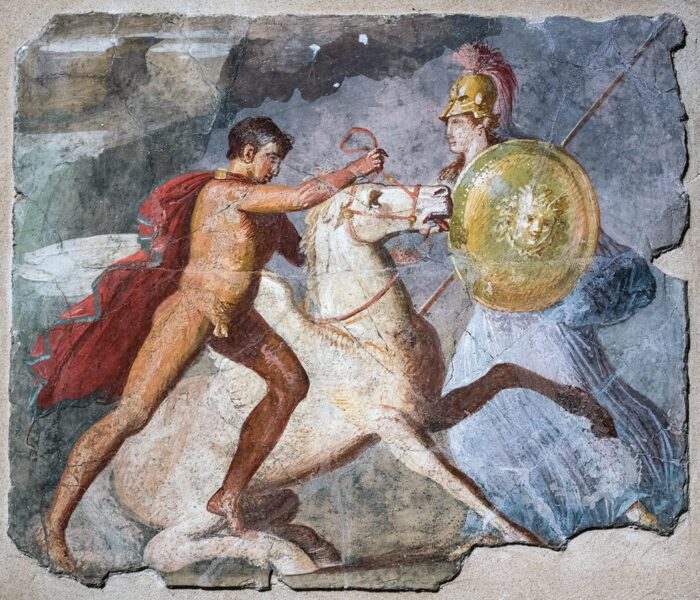

Ah, Bellerophon is the Hero with the wild ride on a winged horse and a showdown with a creature straight out of a nightmare!
Bellerophon, just an everyday Corinthian prince, gets sent to King Proetus‘ court. But then, oh boy, he’s accused of trying to sweep the queen off her feet. Talk about a royal mess! Instead of a romantic comedy, he’s given a one-way ticket to a dangerous town with a bunch of impossible tasks. Proetus is hoping those tasks will do him in.
But Bellerophon isn’t your average Joe. He hops on Pegasus, his trusty winged steed – thank you, Athena – and takes on the Chimera. Now, this isn’t your ordinary beast; we’re talking lion head, goat body, and a serpent’s tail – a real monster mashup. Armed with a spear and some Pegasus power, Bellerophon manages to take down the Chimera like a true hero.
After that victory, he’s not one to kick back and relax. He goes on to tackle Amazons and Warriors named Solymi, who sound like they’re straight from an action-packed fantasy novel. But here’s the kicker – his pride takes a detour to the clouds. He decides he’s gonna give Mount Olympus a visit – you know, the home of the gods. That’s where things go south. Pegasus isn’t having it and throws him off.
And so, the tale of Bellerophon takes a twist. Once a hero soaring high, he ends up blind and crippled, wandering as a beggar. It’s like a lesson in the dangers of thinking you’re invincible.
So, there you have it – a rollercoaster of a journey where a mix of courage and ego ultimately writes the script. Bellerophon, the guy who rode Pegasus and took on the Chimera, only to learn that even heroes can’t outfly their own hubris.
Atalanta
Atalanta is the only female heroine who could run circles around anyone, and I mean that literally! Her story is like a mix of athleticism, goddess intervention, and some golden apples thrown into the mix.
So, here’s the scoop: Atalanta’s got this wild backstory. Abandoned by her dad King Iasus of Arcadia as a baby and raised by a she-bear in the woods. Talk about a unique childhood, right? But that forest upbringing turned her into this speed demon with incredible hunting skills. Archery, racing, you name it – she could give the guys a run for their money.
Now, Atalanta’s no ordinary huntress. She’s got a vow of chastity going on, sworn to the goddess Artemis. A strong-willed woman who’s all about breaking those gender molds of ancient Greece. But, you know how stories go – there’s always a twist.
Along comes this suitor, Hippomenes, who decides he wants a piece of the action. But he’s smart – he knows he can’t beat Atalanta in a fair race. So, he gets a little divine help from Aphrodite, the goddess of love. She hands him three golden apples and gives him the ultimate game plan – distract Atalanta with these shiny beauties.
And you won’t believe it – it works! During the race, Hippomenes throws these golden apples, and Atalanta just can’t resist picking them up. It’s like a modern-day person trying to ignore a ringing phone – impossible! And yep, you guessed it, Hippomenes wins the race and gets to marry Atalanta.
Her tale is like a blend of girl power, goddess interference, and a sprinkle of romance. Atalanta was all about breaking boundaries, showing that girls could be just as fierce and competitive as guys. And those golden apples? Well, they turned out to be more than just a healthy snack – they sealed the deal for her unexpected romance.
In Brief
These ancient Greek heroes had it all: strength, smarts, and courage that could put modern-day action movie characters to shame.
Imagine being in their shoes, standing out in a crowd of ordinary folks. They weren’t just strong; they were “move mountains with a flick of a finger” strong. But it wasn’t just about muscles; they had brains too – coming up with clever plans to conquer impossible challenges.
Did their stories spread like wildfire? These guys were like the A-list celebrities of their time, with their epic tales turning into blockbuster hits. Think about it – their adventures were told through epic poems, stage plays, and all sorts of artistic creations.
And here’s the kicker – their stories aren’t gathering dust in some ancient scrolls. Nope, they’re still alive and kicking today, inspiring folks like us with their tales of bravery, determination, and out-of-the-box thinking. It’s like they’re saying, “Hey, you can conquer anything if you’ve got heart, brains, and a dash of heroism.” Their legacy lives on, reminding us that even in our modern world, the spirit of these ancient heroes can still fire up our own quests for greatness.






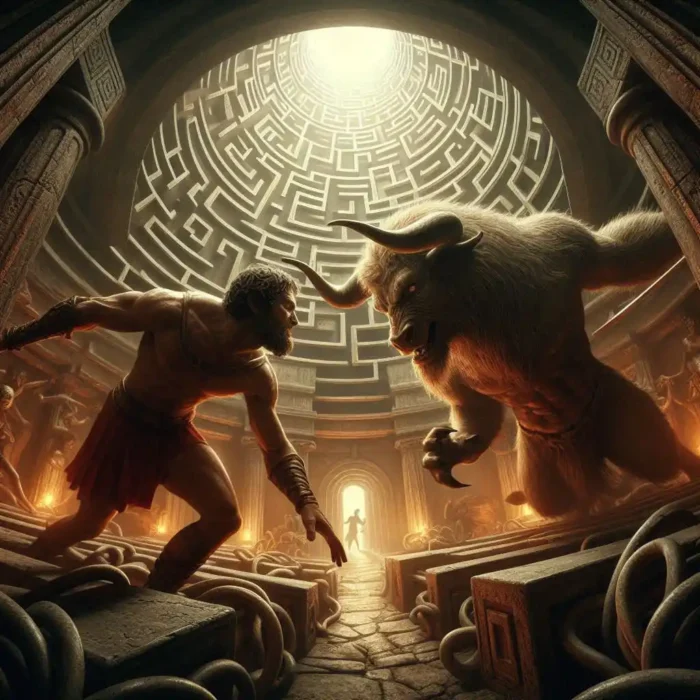


Comments